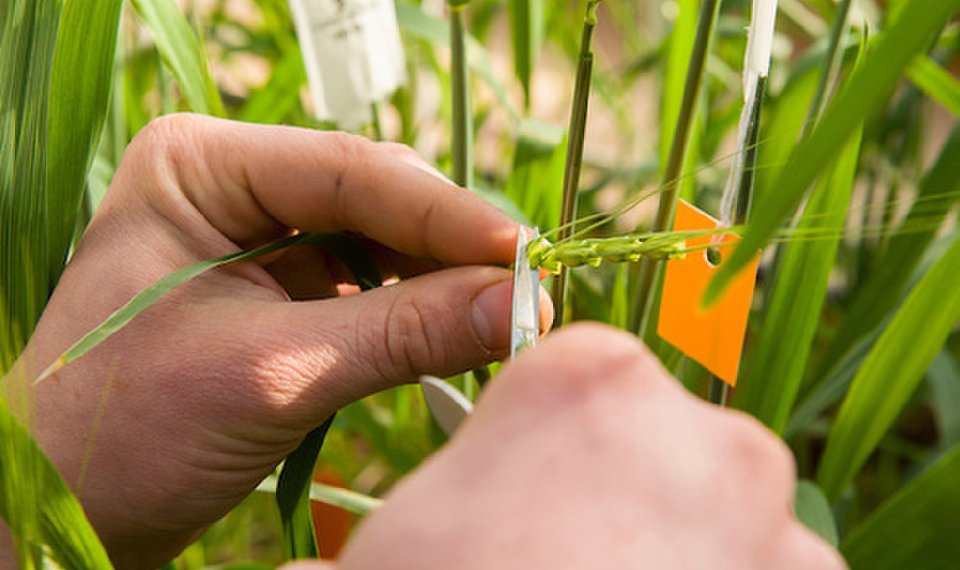Gene Editing Innovations Present Many Benefits to Farmers and Their Customers
The world keeps changing rapidly through new technological advances such as gene editing. Agriculture, fortunately, benefits from many of these new technologies, helping feed more people on less land into the future.
In addition, diets and consumer preferences are changing around the world. There is increased demand for animal protein (leading to more feed grain demand), for higher quality baked products as incomes increase, a greater desire to understand product sustainability and where and how food is produced.
For centuries farmers have selected desirable traits to improve crops and livestock, including such innovations as shorter wheat plants needed to support the dramatic increase in yield potential resulting from the Green Revolution. Agriculture advances rapidly and keeps up with the changing demands largely because of advancements in production practices and plant breeding technologies through selective breeding, cross breeding, hybrids, marker assisted selection, genetic modification, and now gene editing.
Benefits of Gene Editing
Gene editing is the ability to precisely select genes in an organism’s genome to make targeted changes. This can also occur through conventional breeding – but with much more precise outcomes in less time due to gene editing. There are different types of gene editing technologies, such as CRISPR and TALENS. The advantages of these innovative breeding techniques will help bring more specific advancements in wheat to market more quickly and at a lower development cost, which would allow for a wide range of developers in the field to bring new products to market.

Gene editing offers more precise outcomes and less time getting improved wheat varieties to commercialization. For public wheat breeding programs seen in this trial at Colorado State University, gene editing also has the potential to reduce research costs.
According to a study by North Dakota State University (NDSU), the average cost of the process from research and development to market is greater for GMOs than gene editing. The study estimates that the average cost for gene editing is $13.3 million while GMOs averaged $80.7 million.
Like genetically modified organisms (GMOs) and other breeding methods, science and regulators demonstrate the safety of gene editing. Gene editing also holds excellent promise as a technology that supports sustainable food production. Desirable traits such as improving a crop’s ability to tolerate drought, producing more on less land, and improving disease resistance. Just as GMO technology has done, gene editing can help sustain a long-term reduction in the use of crop protection products and fertilizer.
Gene Editing Research
The gene editing research happening today is looking at edits that would be positive for producers, consumers and the environment. For example, Calyxt has developed high fiber wheat using gene editing. The company hopes to release that trait through a closed-loop system – potentially in the next few years. To help consumers get enough fiber in their diets, this trait would positively improve human health. There is also research to develop a modified gluten wheat variety, which could be helpful to those that have a gluten intolerance.
Gene Editing Around the World
Several signs point to this innovative technology garnering more acceptance around the globe than GMOs have received. The world is beginning to recognize gene editing as a valuable tool, and many countries are currently revising their biotechnology regulations to positively incorporate gene editing technology in agriculture.
To date, the United States, Canada, Australia, and Japan have released guidance or proposed guidance on how to regulate gene edited crops. Those concepts mainly indicate that if there is no plant pest risk or foreign DNA in the final product, the gene edited crop would not be regulated.
In 2018, the Court of Justice of the European Union ruled that gene editing technology was to be treated equally to GMOs, which are essentially banned in the EU. This spring, in a surprising announcement, the EU Commission released a report on gene editing stating that gene editing is different than GMO technology and should not be regulated in the same way. Although this is exciting, it is expected to take some time for the EU to determine its final regulations. However, this report opens the discussion for the EU to consider this new technology and see the benefits of embracing it to meet the needs of the world today, including the EU’s sustainability goals and feeding a growing population.
UK Consultation
Since separating from the EU, the United Kingdom (UK) held its own consultation on gene editing. The results from the consultation are expected to be released this year, but historically the UK has had a more positive view on science-based decisions than the EU. The UK’s Department for Environment Food and Rural Affairs (Defra) stance is that “organisms produced by [gene editing] or by other genetic technologies should not be regulated as GMOs if they could have been produced by traditional breeding methods.” The consultation only impacts England, meaning the other UK countries would have to revise their own biotech regulations. This creates a challenge for some, including Northern Ireland, since it is still treated as part of the EU customs union under the BREXIT agreement.
Should the EU accept the safety of this technology, it can positively influence regulators in other countries. Positions on gene editing in many African and Asian countries are still in the early development phase, but it is believed that China will likely embrace this new technology and regulate gene editing the same as conventionally bred crops.
If the world can take a science-based approach to gene editing, there is the potential for several positive outcomes and advancements for trade, science, sustainability, food production, and agricultural advancement. However, if the EU and other countries continue enforcing anti-science agendas, there could be a negative impact on this promising new technology. With a growing global population to feed, agriculture cannot afford setbacks.

In the wheat breeding program at Oklahoma State University scientists work long days crossing thousands of wheat prodigy using genetic stock from around the world. Gene editing can help breeders develop varieties that produce more and better quality wheat for a growing world.
As technology advances around the world, USW hopes to see it embraced without disrupting trade. Therefore, it is essential to use a science-based approach when developing policies affecting gene editing and other new technologies. USW and the National Association of Wheat Growers (NAWG) share a joint Wheat Breeding Innovation Committee (WBIC) that has informed breeders that it expects to be notified as early as possible of any wheat trait developed through plant breeding innovation technology. In that way, USW can gain input from major importing customers before such a product enters the U.S. commercial market to mitigate and eliminate potential trade barriers. You can access WBIC principles for commercialization here and the position statement here.
By Shelbi Knisley, USW Director of Trade Policy
Visit these websites for more information about the benefits of gene editing innovations.
https://geneticliteracyproject.org/
https://www.bestfoodfacts.org/category/gene-editing/
https://www.nationalgeographic.com/environment/article/food-technology-gene-editing


